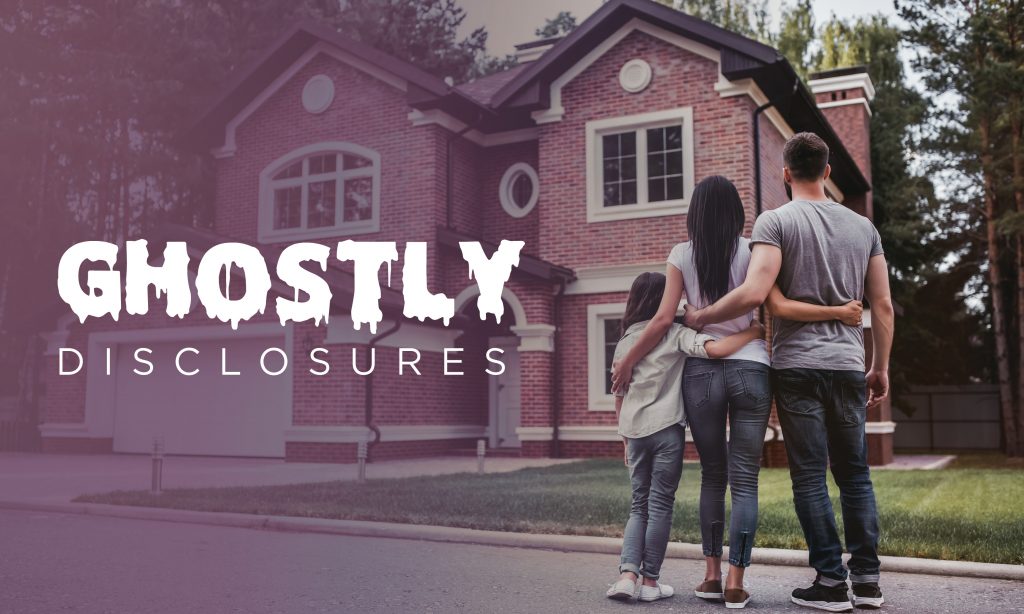Most real estate professionals know the ins and outs of disclosing physical damage or immediate hazards about a home to potential buyers. Whether its faulty wiring in the basement, or mold damage due to moisture, there’s a disclosure form for that. But what about issues with the property that aren’t so apparent — more psychological, stigmatized… or even haunted?
A stigmatized property is any building that has a detrimental issue that is not related to the physical condition of the house. This could include a sordid history – say, a murder or suicide on the premises – or even a belief that the house has a supernatural visitor. In Florida, disclosure laws are a bit messy when it comes to disclosing stigmatized events. The law states that the seller has no obligation to disclose any sort of death that occurred on the property. When it comes to a potential hauntings though, it’s all subjective. “Haunting or unexplainable activity on the property is not a condition that has been well litigated through the courts, so the duty to disclose is not clear,” said Juana Watkins, general counsel and vice president of Law & Policy for Florida Realtors, adding the duty to disclose depends on the beliefs of the parties involved. “Whether a buyer or seller believes in paranormal activity will likely shape their view on whether this is a known fact. In short, it depends.”
Brokers in Florida should count their blessings, as several other states throughout the country are much more exacting about their disclosure laws. In California, anything that could affect the material value of a home is required to be disclosed. That includes death and property that is stigmatized, such as a property that is known to have a haunting past. “Anything that affects, or could potentially affect, the material value of the property needs to be disclosed,” said Cindi Hagley, owner of the Hagley Group in Pleasanton, California. “If there’s been a death on the property in the last three years, that must be disclosed. Manner of death doesn’t need to be disclosed, but if were asked about it as licensed [real estate professionals], we want to disclose that if they ask about it…”
Hagley, who’s known throughout California as the stigmatized home specialist, noted that it’s not just about ghostly visitors. “Stigmatized homes could be a meth lab,” she said, noting that haunted houses are relatively rare. As a consultant for many agencies around the country, she always recommends that agents disclose as much as possible, even if the state doesn’t require it. “If there was a mass murder on a piece of property and a buyer who was looking from out of state doesn’t know this, I think the buyer should know that that happened,” she said, noting that the buyer could have a case for a lawsuit.
Watkins says the devil is in the details. The seller and real estate professionals should have frank conversations about the history of the home in order to prevent a future buyer from alleging a failure to disclose. “If the seller firmly believes the house is haunted, it may be good for the seller and real estate profession to discuss why,” she said. “Are there unusual sounds that cause the seller to believe this? If a seller firmly believes the house is haunted but does not want to disclose, it is always advisable that the seller and real estate professional seek the advice of counsel…the details matter legally.”
The Florida disclosure laws don’t look like they will see any big change anytime soon, and Watkins says it’s hard to predict if they will change in the future.
Agents across the country have had to deal with spooky homes that have a pretty dark history. Robert Giambalvo, a Redfin agent based in California, recently sold the infamous Los Angeles house that was the site of the Manson murders of Leno and Rosemary LaBianca in 1969. The “Ghost Adventures” host Zak Bagans bought the home, which makes obvious sense for his interest in the supernatural. Giambalvo says he didn’t experience anything strange or out of the ordinary while showing the home, but his biggest challenge was weeding out the serious clients from the Instagramers wanting a photo-op. “We probably had over a hundred tour requests, probably only showed it to about 20 people,” says Giambalvo. “There’s no photography allowed… they have to demonstrate their ability to purchase.” This included clients showing Giambalvo their bank statements and getting pre-approval from their banks.
Aside from the home’s gruesome history, the 280-degree views of downtown LA made the home desirable to many, says Giambalvo. Many buyers didn’t even ask him questions about the home’s past. “How long does something need to pass where something like that becomes insignificant?” he asked. “I bet you that most of the people that saw the house were probably born after 1968, so it’s not really a significant thing to them.”
Watkins points out that there is a market for haunted homes, believe it or not. “The average real estate professional may not have experience with this type of special property,” she said. “If the agent feels they have sufficient skill to handle such a transaction, they may be able to leverage their contacts to try to locate a suitable property.”
Hagley’s advice when showing stigmatized homes is to keep your emotions out of it when dealing with a buyer. “If you’re showing an allegedly haunted home, be neutral because you don’t know how that prospective buyer feels,” she says. “If you’re in a home, be respectful. Also, if you do believe in the paranormal, the last thing you want to do is upset one of these spirits.”

